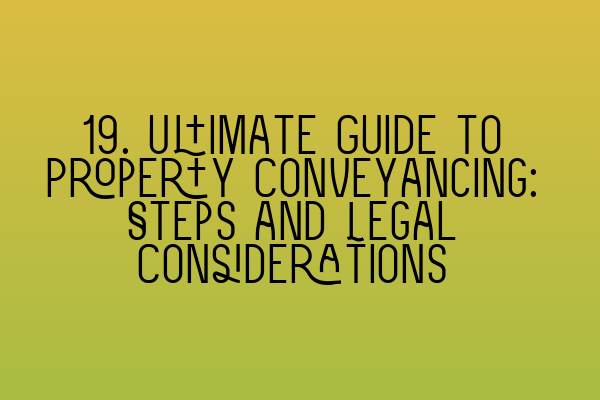Ultimate Guide to Property Conveyancing: Steps and Legal Considerations
Welcome to SQE Property Law & Land Law, where we strive to provide our clients with expert advice and guidance on property conveyancing. Whether you’re a first-time buyer or an experienced investor, understanding the conveyancing process is essential to ensure a smooth and successful transaction.
In this ultimate guide to property conveyancing, we will walk you through the steps involved in the process and highlight important legal considerations to keep in mind. Let’s dive in!
Step 1: Instruction
The conveyancing process begins with the instruction of a solicitor. It’s crucial to choose a reliable and experienced solicitor who specializes in property law. At SQE Property Law & Land Law, our team of expert solicitors is well-equipped to handle all aspects of property conveyancing.
Once you’ve instructed a solicitor, they will begin the necessary groundwork, including conducting searches and gathering relevant documentation.
Related Article: SQE 1 Practice Exam Questions
Step 2: Pre-contract Enquiries and Searches
During this stage, your solicitor will send out pre-contract enquiries to the seller’s solicitor. These enquiries address any concerns or queries you may have regarding the property.
Simultaneously, your solicitor will also carry out various searches, such as local authority searches, drainage and water searches, and environmental searches. These searches are important as they provide essential information about the property and its surroundings.
At SQE Property Law & Land Law, we understand the importance of thorough searches and detailed pre-contract enquiries to ensure transparency and protect your interests.
Related Article: SQE 1 Practice Mocks FLK1 FLK2
Step 3: Reviewing the Contract
Once the searches and pre-contract enquiries are complete, your solicitor will review the contract provided by the seller’s solicitor. They will carefully examine the terms and conditions, identify any potential issues, and negotiate necessary amendments to protect your rights and interests.
It’s vital to have an experienced solicitor from SQE Property Law & Land Law review the contract thoroughly to ensure compliance with legal requirements and safeguard your investment.
Related Article: SQE 2 Preparation Courses
Step 4: Exchange of Contracts
Once both parties are satisfied with the contract terms, the exchange of contracts takes place. During this stage, the buyer pays a deposit (typically 10% of the property price) to the seller, and both parties become legally obligated to complete the transaction.
At SQE Property Law & Land Law, we handle the exchange of contracts efficiently and ensure that all necessary documentation is in place for a seamless transition to the next stage.
Related Article: SQE 1 Preparation Courses
Step 5: Completion
The completion stage is when the property ownership officially transfers from the seller to the buyer. At this point, the remaining balance of the purchase price is paid, and the keys to the property are handed over.
Our expert solicitors at SQE Property Law & Land Law will oversee the completion process, ensuring all necessary legal requirements are met and providing you with peace of mind.
Related Article: SRA SQE Exam Dates
Step 6: Post-completion
After completion, your solicitor will handle post-completion tasks, including registering the property with the Land Registry, paying Stamp Duty Land Tax (if applicable), and transferring any existing mortgages.
Our dedicated team at SQE Property Law & Land Law will guide you through the post-completion process, ensuring all necessary actions are taken promptly and accurately.
Legal Considerations
Throughout the property conveyancing process, it’s crucial to consider various legal aspects. These include:
- Understanding the terms and conditions of the contract
- Identifying potential legal issues, such as restrictive covenants, planning permissions, or leasehold complexities
- Complying with legal requirements, such as obtaining necessary permissions and licenses
- Understanding the implications of Stamp Duty Land Tax and other applicable taxes
- Ensuring the property is free from any legal disputes or claims
Our experienced solicitors at SQE Property Law & Land Law possess in-depth knowledge of property law and can provide comprehensive legal advice to protect your interests throughout the conveyancing process.
For further information, or to discuss your property conveyancing requirements with one of our expert solicitors, please contact us today.
